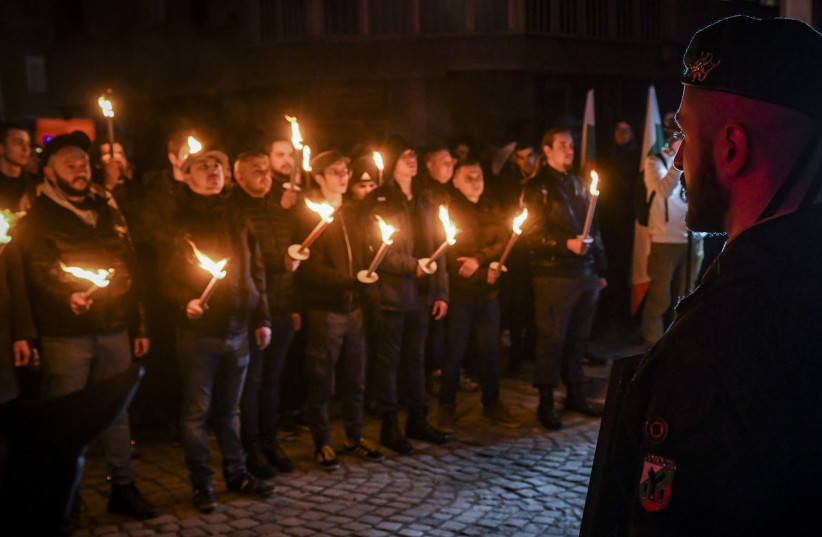Five years ago, with the strong leadership of World Jewish Congress President Ronald S. Lauder, we rallied against one of the most prominent annual neo-Nazi marches in Europe, the Lukov March, the annual procession in honor of a Bulgarian fascist leader from the time of the Second World War.
For this I was brutally targeted by its organizers who responded to the WJC’s campaign: “No mister, with a name of a brand of sewing machines, the problem of Bulgaria is not the Lukov March. The problem is that there are people with too long noses like you, who are burning with desire, snooping where they do not belong. But be sure that whatever you do, General Lukov will receive a worthy honor from the Bulgarian youth!”
I am proud to say that the march did not take place this year thanks to the strong and vital support of Prosecutor-General Ivan Geshev, Sofia Mayor Yordanka Fandakova, Interior Minister Ivan Demerdzhiev, and local Jewish leaders like Nikolay Galabov, chairman of the Zionist Federation in Bulgaria, Prof. Dr Aleksandar Oskar, president of Shalom Organization, and Prof. Rumyana Christidi of Sofia University.
That said, the fight is far from over. Eighty years after the Holocaust, antisemitism continues to raise its head, and neo-Nazi parades like the Lukov march are a hotbed for spreading Jew hatred and racism.
Bulgaria's history of standing up for its Jewish community
Bulgaria has a unique opportunity to be a leader in fighting antisemitism in the European Union, as history stands by its side. The Balkan country has a proud history of standing up for its Jews in the face of hostility.

Despite the nation’s alliance with the Nazis during World War Two, the Bulgarian Jewish community was saved thanks to the shared efforts of members of the Bulgarian parliament and the Bulgarian Orthodox Church, who helped bolster the resistance of Bulgaria’s King Boris III to cancel the deportations.
Unfortunately, the 11,343 Jews of Greek Thrace and Yugoslav Macedonia, the Bulgarian annexed territories, did not share the same fate as the Jews of Bulgaria, and were brutally murdered in Treblinka.
In 2008, The Republic of Bulgaria officially accepted blame for the murder of those Jews during the Shoah. “When we express justifiable pride at what we have done to save Jews, we do not forget that at the same time there was an antisemitic regime in Bulgaria and we do not shirk our responsibility for the fate of more than 11,000 Jews who were deported from Thrace and Macedonia to death camps,” said then Bulgarian president Georgi Parvanov, while on an official visit to Israel.
BEFORE THE WAR, there were 50,000 Jews in Bulgaria, who constituted 0.8% of the total population of the country. All but 5,000 of them made aliyah after the Holocaust, making it one of the countries with the largest percentage of those who immigrated to Israel. Israelis of Bulgarian heritage continue to serve as an important bridge between their new and old countries.
Today, the Bulgarian community in Israel is thriving, and it is essential to remember and honor the history and resilience of the Jewish people in Bulgaria.
For all of these reasons, and many more, we call on the Bulgarian Parliament to formally outlaw the annual torch-lit procession honoring the despicable general Hristo Lukov, who led the pro-Nazi Union of Bulgarian National Legions during World War II. This organization orchestrated the deportation of the Jews from Bulgarian-occupied territories to the Treblinka death camp, and planned to erase the Jewish community of Bulgaria.
The Lukov March has become a magnet for some of the most extreme elements in Europe, with far-Right and neo-Nazi groups from Germany, Sweden, Hungary, Estonia, and other countries joining the march in previous years. They call themselves Bulgarian nationalists and describe Lukov as a “Bulgarian hero.”
Banning the march would send a clear message throughout the continent, where extremism is sadly growing and antisemitism is raising its ugly head in ways not seen since the end of the Shoah, that their presence is not wanted.
In 2017, Bulgaria’s cabinet voted to adopt the International Holocaust Remembrance Alliance Working Definition of antisemitism, and the cabinet appointed Deputy Foreign Minister Georg Georgiev as the national coordinator on combating antisemitism, a permanent position.
Many academic institutions have also followed suit. We hope to see IHRA adopted in all levels of government and Bulgarian institutions.
It is uplifting to see a nation committed to fighting hate, intolerance, and antisemitism in all of its manifestations. Nevertheless, while the Lukov March was prevented this year, until it is legally placed beyond the pale, it can return in the future. Ensuring that it doesn’t take place through various measures without its full and formal proscription is akin to placing a bandage on a bullet hole.
The democratically elected representatives of the Bulgarian people must stand up against those who celebrate the Nazi regime and the slaughter of European Jewry. It must state loudly and clearly that these views have no place in modern Bulgaria, and Sofia must not be a magnet for the most extreme elements in Europe.
It is time to end the Lukov March, once and for all.
The writer is a member of the CAM (Combat Antisemitism Movement) Board of Governors.
